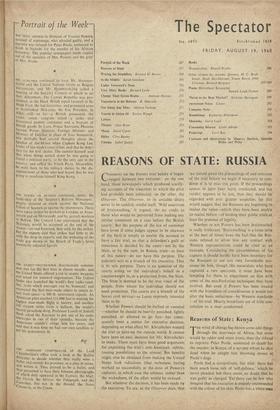REASONS OF STATE: RUSSIA
COMMENT on the Powers trial before it began ranged between two extremes: on the one hand, those newspapers which produced scarify-
ing accounts of the treatment to which the pilot
had probably been subjected; on the other, the Observer. The Observer, in its amiable desire
never to be caddish, outdid itself. 'Wild assertions similar comments on a case before the British
courts.' But the purpose of the law of contempt here (even if some judges appear to be unaware
of the fact) is simply to enable the accused to have a fair trial, so that a defendant's guilt or innocence is decided by the court—not by the State, or by the mob. In Russia, trials—at least of this nature—do not have this purpose. The judiciary acts as a branch of the executive. That is its sole purpose. There is no question of the courts acting on the individual's behalf as a counterweight to, or a protection from, the State.
The State is deemed to be the true voice of the people, from whom the individual should not need protection. The courts are a branch of the Soviet civil service—as Lenin expressly intended them to be.
Whether Powers should be bullied or cosseted —whether he should be heavily punished, lightly.
punished, or allowed to go free—has conse- quently been a matter for executive decision, depending on what effect Mr. Khrushchev waRted the trial to have on the outside world. It cannot have been an easy decision for Mr. Khrushchev to make. There must have been good arguments for ,exploiting the trial's anti-American, rabble- rousing possibilities to the utmost. But benefits might also be obtained from making the United' States look ridiculous (that technique having worked so successfully at the .time of Powers's
capture); in which case the silliness, rather than the wickedness, of the affair woOld be stressed. - But whatever the decision, it has been made by the executive. To say, as the Observer does. that 'we should await the proceedings of and outcome of the trial before we begin if necessary to con- demn it' is to miss this point. If the proceedings appear to have been fairly conducted, and the verdict appears to be just, then they should be regarded with ever greater suspicion; for this would suggest that the Russians are beginning to realise the value--which they have been unable to realise before—of lending their public trials at
least the pretence of legality.
Whether or not Powers has been brainwashed is really irrelevant. 'Brainwashing' is a loose term at the best of times; even the fact that the Rus- sians refused to allow him any contact with Western representatives could be cited as an example. Considering the circumstances of his capture it should hardly have been necessary for the Russians to use any very formidable pro- cesses on him, though like naturalists who have captured a rare specimen, it must have been tempting for them to experiment on him with
some of the neo-Pavlovian techniques they have evolved. But even if Powers" has been treated with the friendliest of consideration it would not alter the basic unfairness—by Western standards —of his trial. Hearty, breakfasts are of little con- solation to a man condemned.


































 Previous page
Previous page